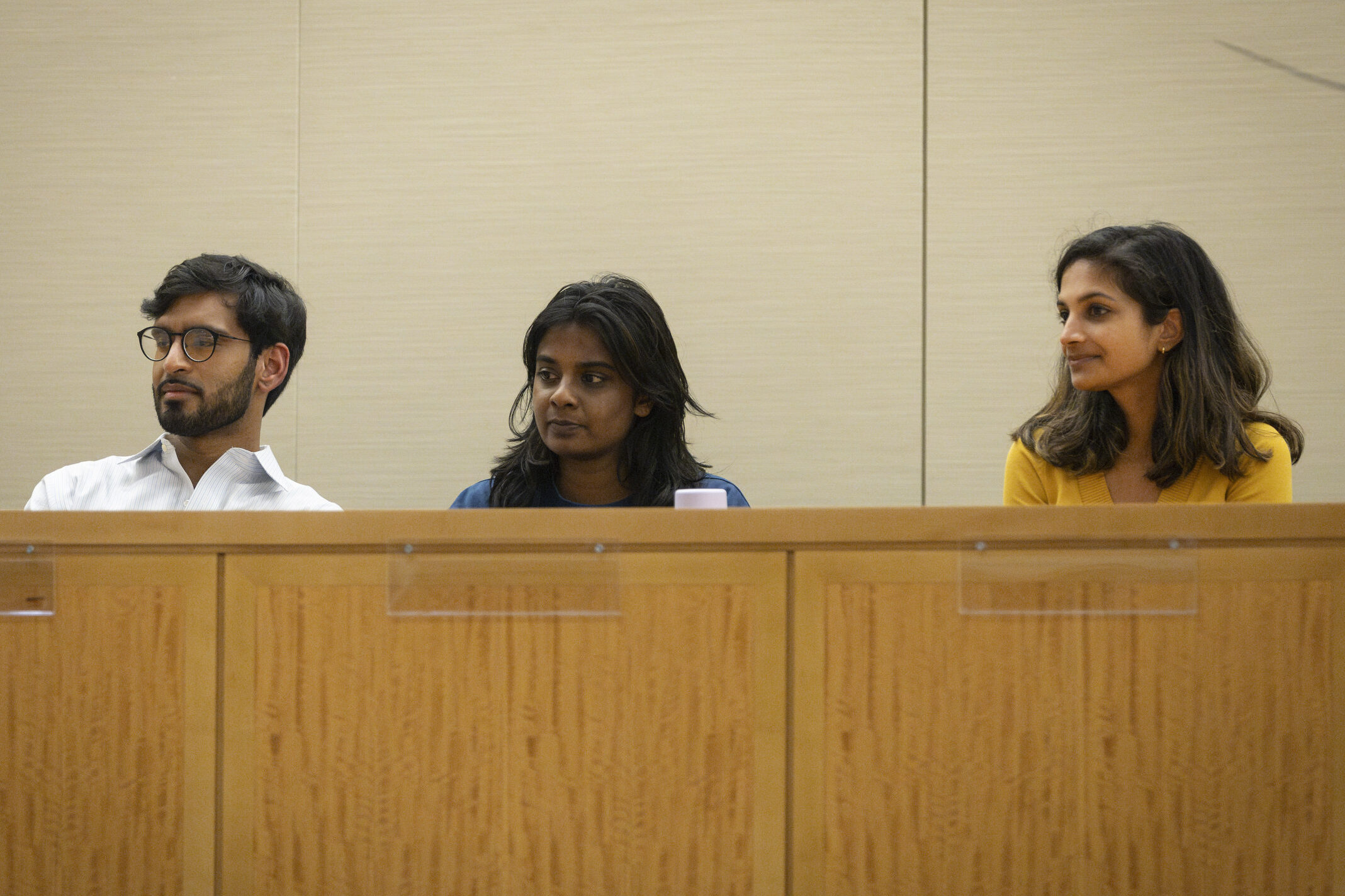
Eric Beerbohm, senior adviser for civil discourse in FAS, discussed divisions in Sri Lanka with Madura Rasaratnam, Mario Arulthas, and Kate Cronin-Furman.
Photos by Niles Singer/Harvard Staff Photographer
What’s next for Sri Lanka?
Scholars take measure of divided nation after students push for broader conversation
Kate Cronin-Furman, a human rights expert and political scientist at University College London, walked into a Harvard lecture hall last week and saw the words “Crisis in Sri Lanka” projected in big letters.
Her first thought: Which crisis?
“There’s a solid argument for viewing the state as one of perpetual crisis,” she said.
Cronin-Furman was one of three speakers to explore Sri Lanka’s past, present, and future during an event co-sponsored by the Lakshmi Mittal and Family South Asia Institute, Edmond & Lily Safra Center for Ethics, and Weatherhead Center for International Affairs. The panel came together at the behest of three Harvard graduate students with deep roots in the island nation.
The students started organizing last spring following an appearance by Sri Lankan President Ranil Wickremesinghe co-hosted by the Mittal Institute and Center for International Development. The students had protested that event with tough questions and fliers describing human rights abuses against the nation’s Tamil ethnic minority.

“We weren’t necessarily protesting his speech,” said Sai Rajagopal ’20, M.D. ’26. “We were protesting the lack of context, the lack of justice, and the lack of true freedom of discourse.”
Organizers had ensured that respectful acts of dissent were allowed in the room. As a further response, Mittal Institute Executive Director Hitesh Hathi, M.A. ’97, invited students to propose further Sri Lanka-themed dialogues. The result was a two-part “Crisis in Sri Lanka” series moderated by government professor and Ethics Center faculty director Eric Beerbohm, who was recently appointed senior adviser for civil discourse in the Faculty of Arts and Sciences.
“With everything Harvard is going through, I think this can be a bit of a model for how to have very difficult conversations,” Hathi said.
The three panelists in last week’s event, held at the Center for Government and International Studies, spoke at length about the Sri Lankan Civil War, which exploded in July 1983 and ended in 2009 with the massacre of tens of thousands of Tamil fighters and civilians. But the history lesson went even further back, providing a fuller picture of discrimination and dysfunction.
Tamil human rights advocate Mario Arulthas, currently a Ph.D. candidate in politics and international studies at the University of London, began his remarks with the end of British Rule in 1948. That’s when the Tamil minority, who had been looked upon favorably by the British, saw their situation reversed.
More than seven decades later, Arulthas said, the island’s deep political and ethnic divides feel especially stark every Feb. 4, when Sri Lankans mark Independence Day. Every year the government, dominated by members of the Sinhalese majority, hosts “a massive military parade” in the capital city of Colombo.
“But if you were in any part of the northeast of the island — the territory that is claimed as a traditional homeland for the Tamils — you’d observe a very different picture,” Arulthas said. “The day is marked with protests. Tamil houses are decorated with black flags. … They say the day only marks independence from foreign rule for the Sinhalese people, not for the Tamil people.”
Madura Rasaratnam, a senior lecturer in comparative politics at City University of London, anchored her remarks in the most recent Sri Lankan crisis to command international attention. The country defaulted on its debt for the first time in March 2022. “Shortly after that, there were roiling protests and gas shortages and electricity blackouts,” she said. Prime Minister Mahinda Rajapaksa and his brother, President Gotabaya Rajapaksa, resigned amid the unrest.
They were “practically forced out by crowds of people,” she said.
Rasaratnam went on to describe what she called the “shifting tectonic plates beneath this rupture,” including decades of deficit-spending on “white elephant” transportation infrastructure and projects designed to change the demography of Tamil-speaking areas.
“Investment-development decisions are directed toward Sinhalese nationalism, rather than things that are economically productive,” she argued.
Is there hope for accountability in Sri Lanka under Wickremesinghe, who has postponed elections in the past? None of Wednesday’s panelists were especially hopeful.
“It’s a hard case,” Cronin-Furman said. “It’s not one where systematic change looks possible in the foreseeable future.”
“Sri Lanka in Crisis” continues April 10, with a conversation exploring justice, gender, and movement building.





